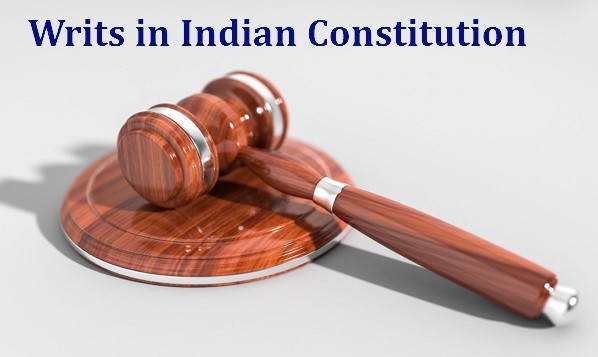(Author: Muskan Krishnani, pursuing B.B.A,. LLB (Second Year) from Amity University, Chhattisgarh.)
As rightly pointed out, rights are futile until and unless backed by some effective remedy for the enforcement of those rights. Judiciary, being third pillar of the democracy, ensures promotion and protection of the basic rights guaranteed to the people of India. Article 32 and Article 226 of the Constitution of India, 1950 entails the remedies available for enforcement of the rights violated. These very same provisions confers power upon the Supreme Court as well as High Court to issue writs.
The formal written legal orders issued by the court to the individuals or authorities violating the rights of other individuals or groups of individuals, can be understood as writs. An individual can file a writ petition in a competent court having the authority to issue any specific right, in case of violation of his rights. Both, Supreme Court as well as high court have inherent power to issue writs. But the high court is having much wider scope than supreme court in the matter of issuing writ, as supreme court can only direct writ in case of violation of fundamental rights mentioned in Part III of the Constitution whereas high court can issue writ in case of violation of fundamental as well as legal rights.
Article 32 of the Constitution basically categorize writs into 5 heads :
Writ of Habeaus Corpus
This writ is issued by the court in the nature of an order to an individual or state authority who has detained or arrested any other individual to produce the latter before the court so as to scrutinize the legal validity of the grounds of such detention. This writ petition can be filed by the arrested person himself or his family or friends. It is used to demand production or release of a person illegally detained.
In the case of ADM of Jabalpur V. Shiv Kant Shukla[i], the bench comprising of five senior most judges, held with majority of 4:1 that this writ of habeaus corpus is not maintainable during the time of emergency. But later on, in the case of K. S Puttaswamy V. Union of India[ii], the court overruled the habeaus corpus case judgment and held that right to life is inalienable to an individual and this writ is maintainable even during the emergency era.
Read Also: FIR Must Be Uploaded On Police Website Within 24 Hours: Supreme Court
But this writ has certain exceptions which includes that it cannot be filed against lawful detention or detention due to contempt of court or the detention is beyond the jurisdiction of the court.
Writ of Mandamus
The writ of mandamus is a command from the court of law to any public authority, or tribunal or statutory as well as non-statutory authority or constitutional body, to perform his public duty. This writ is basically a remedy to do justice to public wrong and cannot be enforced again private parties.
The party filing the petition for enforcement of writ of mandamus has to show that the public officer accused has a duty to perform and he failed or denied to perform so.
In the remarkable judgment of Gujarat state financial corp. V. Lotus Hotels[iii], financial corp was a corporation set up under one 1951 Act which provides loans to other industries. This corp. entered into an agreement with Lotus Hotels to release funds so as to ensure completion of pending construction work of the hotel group. But later on, the corp denied to transfer the funds. So lotus hotels approached the Gujarat High Court for enforcement of its right. The Gujarat HC issued a writ of mandamus to direct the corp to perform it’s promised public duty.
Writ of Certiorari
The writ of certiorari empowers Supreme Court as well as High Courts to command lower or subordinate court to submit their case records for its review. This review is done to ensure whether the judgment of the subordinate court is legally justified or not. The decision of lower court can be considered as illegal when they’ve acted in lack or excess of jurisdiction or unconstitutional jurisdiction or when the court had violated the principles of natural justice.
If the court ascertains that the judgment rendered by the lower court is unconstitutional, then it may quash that judgment and declare it as void.
The court in the case of A.K. Kripak V. Union of India[iv], quashed the judgment of the lower court and applied the writ of certiorari.
Writ of Prohibition
This writ can be issued by the superior court to the lower court to put an end to the ongoing proceeding in case the lower court is acting outside its jurisdiction or in violation of principles of natural justice or fundamental rights. This writ can be issued on the ground of jurisdictional error, violation of natural as well as fundamental rights, etc. This writ doesn’t lie against the executive public authorities or a legislative body. It can be directed only to the lower courts to drop the proceedings of an ongoing case and to prevent them from continuing the case.
Writ of Quo warranto
The literal meaning of this writ is “by what authority “. By issuing this writ, the court questions any public authority that by what authority or by whose warrant, they’ve assumed the public office. Thus, this writ doesn’t aim at enforcing any right or complaining about non-performance of duty. It just questions the authority of public office holder.
Justice Gajendragadkar in the case of University of Mysore V. Govind Rao[v] had clearly elaborated this writ and had held that this writ of quo warranto empowers the judiciary to call upon any public authority to show by what authority is he holding the independent public office or franchise and in case if that authority is having no valid title over it, then to issue this writ to oust him from that office.
These writs are of remedial nature and aims to protect both legal as well as fundamental rights of the people. One can directly approach Supreme Court for the enforcement of their fundamental rights by filing writ petition under Article 32 of the Constitution. It is because of this unique feature, this provision of constitutional remedies is considered as “Heart and Soul of the Constitution. “
[i] (1976) 2 SCC 521
[ii] (2017) 10 SCC 1
[iii] (1983) 3 SCC 379
[iv] A.I.R. 1970 S.C. 150.
[v] 1964 SCR (4) 576




